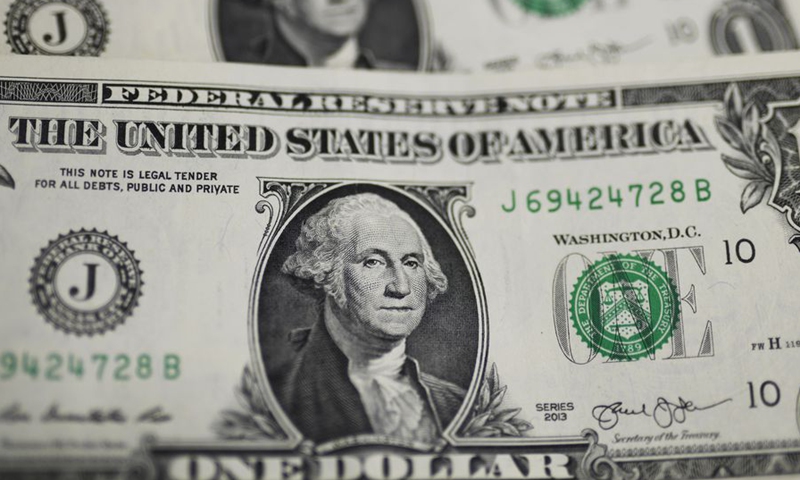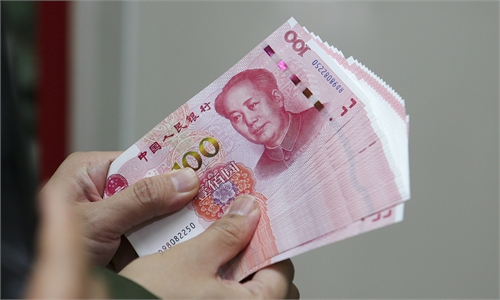China’s FX reserve rises in May after a four-month decline, stability unchanged: official
Solid fundamentals of China's economy support overall stability: official

Photo taken on Sep 18, 2019 shows US dollar banknotes in Washington DC, the United States. File photo:Xinhua
China's foreign exchange reserve rose in May after a four-month decline, as the values of financial assets in major countries stayed mixed with the US Dollar Index falling slightly, but the long-term solid fundamentals of the Chinese economy will continue to support the overall stability of the nation's foreign exchange reserve, an official said.The country's foreign exchange reserve rose to $3.12 trillion in May, up $8.1 billion or 0.26 percent from the end of April, data revealed by the State Administration of Foreign Exchange (SAFE) showed on Tuesday.
"The increase in forex reserve was mainly due to the combined impact of a fall in the US Dollar Index and the mixed performance of global financial asset values, as well as other factors including global economic growth prospects, geopolitical uncertainty and monetary policy expectations in major economies," said Wang Chunying, deputy head and spokesperson of the SAFE.
After the US Dollar Index rose as high as 104.98 on May 12, it fell back to 101.75 as of May 31.
Wang noted that the nation's major forex reserve is denominated in US dollar, so the value of non-dollar currencies will increase after being converted into US dollars. Combined with other factors including changes in asset prices, this contributed to the rise of the country's foreign exchange reserve in May.
The euro rose 1.8 percent against the dollar last month, while the yen was up 0.8 percent and the British pound increased 0.2 percent.
Amid volatility in international financial markets, the prices of many financial assets turned mixed. In May, Japanese stocks rose 1.6 percent while European stocks fell 0.4 percent.
"Along with China's efficient coordination of epidemic prevention and control with economic and social development, the long-term solid fundamentals of the nation's economy have not changed and will support the overall stability of forex reserve," Wang said, as China's cross-border capital flow and the supply and demand in domestic foreign exchange market have maintained a basic balance.
However, amid an escalating geopolitical crisis and increasing volatility in the global financial market, some countries are increasingly concerned about the safety of using US dollar- or euro-denominated assets.
China's forex reserves are again a subject of public interest and debate, with some experts suggesting that the country reduce holdings of dollar assets and increase holdings of other forms of assets.
"In extreme cases, if US dollar assets are frozen by US, it would mean a higher loss. But dollar reserves are facing an increased credit crisis and the risk of depreciation, especially as the US government is found of arbitrarily manipulating the value of the dollar to harvest the riches of global investors," Dong Dengxin, director of the Finance and Securities Institute of the Wuhan University of Science and Technology, told the Global Times on Tuesday.
Dong suggested that China should speed up the adjustment of its reserve assets structure, increase gold reserves, and acquire strategic reserves such as oil and grain.
At the end of May, China's gold reserve stook at 62.64 million ounces (1,948.3 tons), unchanged from the previous month.
"It is more important for the authorities to anchor the yuan and physical assets with strong stability, such as rare resources like rare earths," said Tian Yun, a Beijing-based veteran economist.
Tian said that the government can encourage settlement in yuan for imports of resource-based products or even have partial pricing power, in order to expand cross-border use of the yuan.
With the continuous internationalization of the yuan and its broader use as a reserve currency, the scale of China's foreign exchange reserves should naturally decline, Dong said, noting that $2 trillion should be enough to meet China's demand.
The yuan accounted for 2.79 percent of global forex reserves in the fourth quarter of 2021, compared with 2.66 percent in the third quarter, data from the IMF showed.
The forex regulator will continue to coordinate development and security, pushing for forex market reforms and opening up in a prudent and orderly manner, Wang said on May 17.


